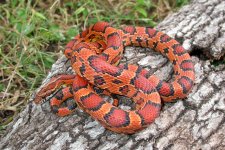Here is my FAQ on taming baby corns. Hope it might be of some help.
Taming and Handling Baby Corns
Please try to put yourself in your new pet's "shoes"...just imagine...
------------------------------------------------------------------------
You were hatched at a breeder's facility and maybe spent all of your
WHOLE YOUNG LIFE thus far in one cage with a particular routine. Then
suddenly your whole world changed. You went to an expo or pet shop, new
cage, new everything. Then some big monsters hundreds of times bigger
than you took you to ANOTHER new home. Another new cage, new routine,
new sights, smells, even the temps and lighting have changed. And now
these giant monsters keep acting like they want to eat you! (At least
the first giant monsters just tossed food in and only moved you around
once in a while.) But they never do actually eat you, they just keep
pretending that they will. Eventually, you will figure out that they
aren't going to eat you after all. And you will figure out that no
matter how you try to escape their grip, or to defend yourself, they
won't put you back in that nice quiet cage. (Of course, if the monsters
DO give in when you defend yourself, and put you back where it is peaceful and quiet,
then you will have learned exactly what to do to get back to that quiet place!)
So eventually you will give up the defensive tactics, get to know your
new home and new routine and maybe even grow to tolerate / enjoy the
warm, gentle hands, especially if the air is cool. But it sure wasn't
easy to get to that point! Hopefully the new owners (aka "monsters")
will realize what you have been going through and try to make the
transition as easy as possible.
Of course, in some cases, the new baby already got used to some of this
in the old surroundings, or the hatchling may just be one of those
animals that is not prone to stress and just naturally adapts quickly to
new situations. But not every animal (or human) can adapt so quickly. So
please take these possibilities into consideration when setting up a new
pet.
Practical Tips:
>
> Go really easy on the handling during the first month after you
> acquire the corn - that is one of the most stressful times in his
> entire life, and he needs to concentrate on adjusting to his new home.
> I would suggest starting to handle him when he has had 2 - 3 days to
> digest his meal and you can't see any bulges at all. Once he is well
> adjusted to his new home, handling your baby for about 10 - 30
> minutes, even more than once on those days just before the next
> feeding, is even better. Usually, he will be pretty wild for the first
> several minutes while he thinks you are getting ready to eat him. Hold
> the little guy over the cage or a garbage can for the first few
> minutes. Both the exercise and the excitement can combine to make him "go"
> when you first start handling him. When they get older, babies will
> only be eating once per week and won't be so excitable, so you won't
> get the same reaction. After several minutes, they are usually emptied
> out.
>
> If you are worried that the baby might escape when you are unfamiliar
> with handling him, then just handle him over the top of the cage (or
> some kind of box that it can't get out of) the first few times. Then
> if he wriggles away or you accidentally drop him, he will be right in
> the cage. After the first few times, you will begin to understand how
> he moves and you won't need to handle him over the safety of the cage
> any longer.
>
> If you pick babies up at all, it is VERY IMPORTANT to keep holding them
> long enough for them to stop struggling and to relax. It is important
> that each session end on a positive note. That is, the snake has
> relaxed for several minutes and is not struggling or trying to bite.
> After the snake has emptied itself over the cage or over a garbage
> can, then sit down for a few minutes with him. Hold fairly tightly
> when he struggles, but relax your grip when he relaxes, tightening
> again if he starts to get a little crazy. They are not the smartest
> animals, but if you are consistent, they will learn:
> 1. They won't get eaten.
> 2. They won't get to go back home until they "behave" themselves.
> 3. The more calm they are, the looser your grip will be.
>
> If you have ever kept and trained dogs, the principles are the same.
If you need to wear a glove for awhile to boost your confidence, then do so.
> Snakes just don't learn quite as quickly as dogs, but they DO learn.
>
> Good luck!
> Kathy Love
>
-
 Any way I backed of and closed the viv glass door. He was then trying to strike me through the glass, all coiled up and head raise like a right nutter.
Any way I backed of and closed the viv glass door. He was then trying to strike me through the glass, all coiled up and head raise like a right nutter.
